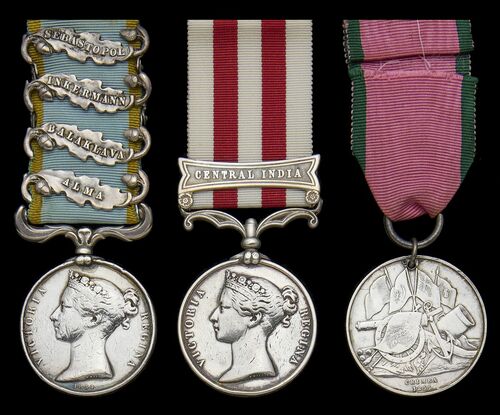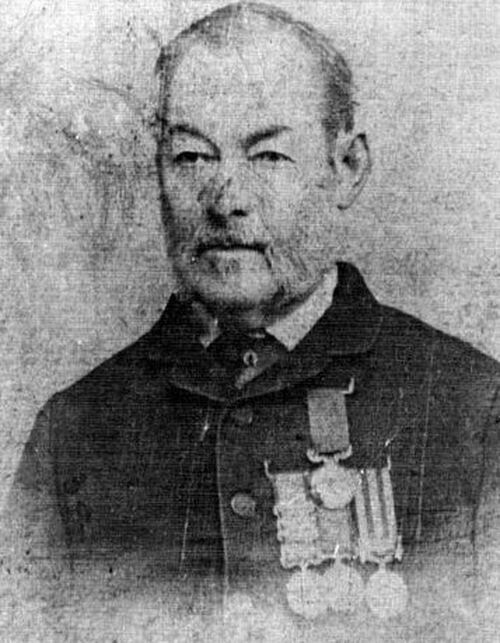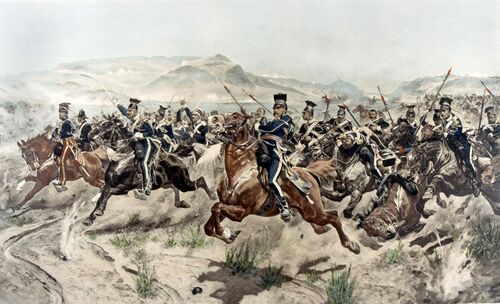Auction: 24002 - Orders, Decorations and Medals
Lot: 139
The campaign group of three awarded to Private J. Doyle, 8th (The King's Royal Irish) Regiment of (Light) Dragoons (Hussars), a confirmed charger who left a famous memoir of the events, on the day his horse was wounded and who himself had a lucky escape:
‘That night when I opened my cloak, I found
23 bullets in it. There were five buttons blown off my dress jacket, the sling of my sabretache were cut off, but my sword belt were not touched. I also had the right heel and spur blown off my boot. It was a long and terrible charge’
Crimea 1854-56, 4 clasps, Alma, Balaklava, Inkermann, Sebastopol (....oyle, 8th Husrs.), contemporary engraved naming, private rivets, some loss to naming due to wear; Indian Mutiny 1857-59, 1 clasp, Central India (John Doyle, 8th Hussars); Turkish Crimea 1855, British issue, unnamed as issued, the first two with heavy edge bruising and contact wear, nearly very fine (3)
John Doyle was born in Dublin and enlisted into the 8th Hussars at Newbridge on 22 February 1850. He was present on Horse Guard Duty at the 1851 Exhibition and also at the funeral of the Duke of Wellington in 1852. He embarked for the Crimea aboard the H.T. Wilson Kennedy on 2 May 1854, and was present at the battles of Alma, Balaklava and Inkermann, and at the siege and fall of Sebastopol. He embarked for India from Cork aboard the S.S. Great Britain in October 1857, and served at Kotah during the Central India campaign. He returned to England aboard the St Lawrence and was discharged, ‘Second period of service expired’, from Longford on 2 December 1873.
He was living in Liverpool in 1875 and his memoirs, entitled A Descriptive Account of the Famous Charge of the Light Brigade at Balaclava, were published in Manchester in 1877. Of the Charge itself he wrote:
‘We charged under a most terrific fire from cannon and musketry; on our right were three tiers of guns, and the infantry as thick as they could be placed; and on our left was one tier of guns, and infantry in masses, so that the shot and shell, grape canister, and musketry came upon us like hail. We had not advanced far, when a comrade on my right, named Heffern, was struck by a shell which exploded at the time, blowing his body into the air, but his hips remained for a long time after in the saddle. I was covered with his remains. Lennan, who brought the dog “Jemmy” with him, was riding on my left, when a round shot struck him on the left side of the head, and I got another splash from him. His body remained in the saddle for some time. My horse got a bullet through his nose, above the noseband, which caused him to lose a great deal of blood, and every time he gave his head a chuck the blood spurted over me. That night when I opened my cloak, I found 23 bullets in it. There were five buttons blown off my dress jacket, the sling of my sabretache were cut off, but my sword belt were not touched. I also had the right heel and spur blown off my boot. It was a long and terrible charge.’
Doyle was a member of the Balaclava Commemoration Society in 1879. An interesting letter from him appeared in the Army and Navy Gazette in January 1891, in which he contested the fact that Captain James Hefferon had taken part in the charge at Balaklava:
‘Sir, - I observed in a copy of the Army and Navy Gazette, dated the 20th of December last, that James Hefferon, late of the 8th King's Royal Irish Hussars, was a trumpeter, and sounded the "Charge" of the Light Brigade at Balaclava on the 25th October 1854. This is wrong. Captain Hefferon joined the 8th Hussars at Brighton in 1850, coming from the Duke of York's School and going into the Band, in which he remained as acting-trumpeter, until the regiment all met together at Exeter in 1854, when the Band was broken up.
James Hefferon went as a duty soldier, remaining as such during the Crimean War. We were at Bidea when we took Prince Woronzoff's cellars and a large amount of stores. We were then despatched 20 miles out from Bidea to capture a spy, whom we secured, and going around by a zig-zag road he broke away from the escort. I jumped out of the saddle, fired at him and struck him in the thigh. J. Hefferon was with the rear-guard.
On our arrival back at Bidea, Hefferon, on entering the lines, dismounted, laying his carbine against the picket-ropes, and when in the act of lifting it off again it went off, and the bullet went through his hand.
His brother, Thomas, was shot on my right during the Charge; a shell met him and exploded and blew his body into the air [see above account]. James Hefferon came to me that night from the hospital outside Balaclava, asked me what had become of his brother, Tommy, and I told him. He was not a trumpeter in the Crimea on the day of the Charge at Balaclava and was not in the Charge at all, he being in the Balaclava Hospital.
I write this simply to correct an error.’
John Doyle died in Liverpool on 14 August 1892 and was buried in Anfield Cemetery, interred in a public grave in the Roman Catholic Division. Known locally, for some unknown reason, as ‘Darby, the Devil’, Doyle was buried without a formal military ceremony, a fact that caused several letters of indignation to be published in the local press, the following extract being an example from one of them:
‘Britain's Old Soldiers Gentlemen, - While Britain allows its old soldiers to drag out their lives in the workhouse. "T. F. S." in your issue of yesterday need not wonder at the powers-that-be refusing to permit a military funeral in the case of the late John Doyle. Had he been one of our city fathers, a big brewer, or even one of our volunteers, mighty efforts would doubtless have been made to render his final obsequies as imposing as possible. But John Doyle had only been "One of the Six Hundred", who made the greatest battle charge the world has ever heard of, or probably ever will again. It is a national disgrace that the fast dwindling remnants of that noble Light Brigade should be shown at their country's hands such indifference, alike in life as in death, and it may yet occur to some that had it not been for the inspiration of a Tennyson the remembrance of that noble charge would have long since been well-nigh forgotten.
We scatter money broadcast in pensions for our scientists, our authors and so forth, but I wonder whether they have not had more chance than "Tommy Atkins" in putting by something for the evening of life. We hear about the inefficiency of the Army, but I venture to predict that whilst our worn-out soldiers receive such wretched treatment, not all the Royal Commissions in the world will avail in elevating the standard of our rank and file...
Walton, August 2nd, 1892. W. R. Williams.’
Subject to 20% VAT on Buyer’s Premium. For more information please view Terms and Conditions for Buyers.
Sold for
£8,500
Starting price
£2500









